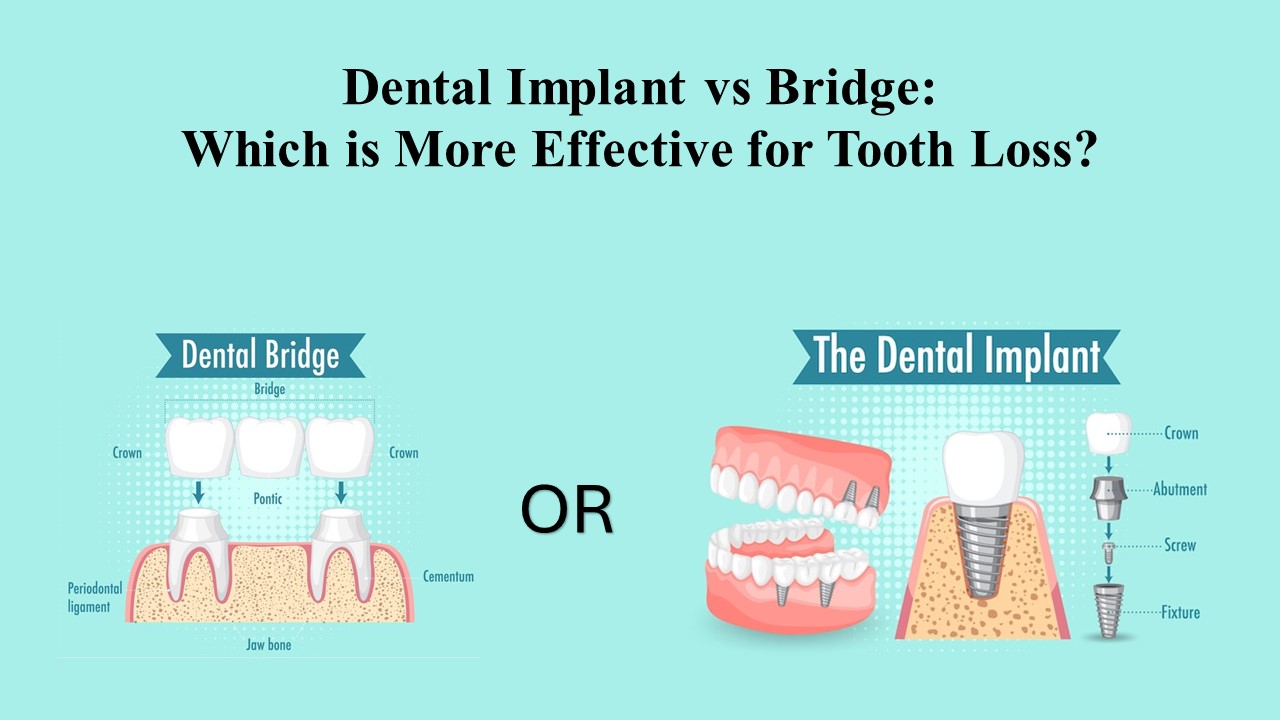Tooth loss is a common dental issue that can affect people of all ages. It can be caused by decay, gum disease, injury, or other factors. If you’re missing a tooth, you know how it can impact your smile, confidence, and even your ability to chew properly.
Luckily, there are two excellent options for replacing missing teeth: dental implants and bridges. But which one is right for you? Read on to learn more.
Table of Contents
What Are Dental Implants?
A dental implant is a small, screw-like post made of titanium. It’s surgically placed into your jawbone by a qualified dentist or oral surgeon. The implant acts like an artificial tooth root, which fuses with your jawbone in a process called osseointegration.
Once healed, an abutment (a connector piece) will attached to the implant. Then, a custom-made dental crown is placed on top, which restores both the look and function of a natural tooth.
Advantages of Dental Implants
Dental implants offer a game-changing solution for replacing missing teeth. Here’s how they can significantly enhance your life:
- Durability: Dental implants are incredibly strong and durable. With proper care, they can last a lifetime, making them a cost-effective solution in the long run.
- Bone Preservation: Unlike bridges, implants actually stimulate your jawbone, preventing bone loss in the area of the missing tooth.
- Natural Look and Feel: Dental implants look and feel just like natural teeth. They allow you to eat, speak, and smile with confidence.
Dental implants are more than just tooth replacements. They’re an investment in your confidence, oral health, and overall enjoyment of life.
Disadvantages of Dental Implants
While dental implants offer numerous advantages, they also come with some drawbacks to consider:
- Higher Upfront Cost: Dental implants are generally more expensive upfront compared to bridges. However, their long lifespan and minimal maintenance needs can make them more cost-effective in the long run.
- Surgical Procedure: Dental implant surgery requires anesthesia and healing time. It might not be suitable for everyone, especially those with certain health conditions.
- Longer Treatment Time: Due to the osseointegration process, the entire dental implant procedure can take several months to complete.
- Not Suitable for Everyone: Certain health conditions or risk factors, like uncontrolled diabetes or heavy smoking, can increase the risk of implant failure. Your dentist will assess your suitability for implants during a consultation.
A dental implant clinic can help you decide whether dental implants or other options are the right choice for you.
What Are Dental Bridges?
A dental bridge is a fixed restoration that literally bridges the gap left by a missing tooth. It consists of dental crowns placed on two or more healthy teeth on either side of the gap, with an artificial tooth to fill the space. The bridge is then cemented or bonded to the crowned teeth.
Advantages of Dental Bridges
Dental bridges offer several benefits that can significantly improve your quality of life:
- Improved Speech: Missing teeth can sometimes affect your speech, making it difficult to pronounce certain words clearly. A bridge restores proper tooth alignment and tongue placement, allowing you to speak confidently and effortlessly.
- Easier Chewing: Missing teeth can make it challenging to chew certain foods effectively. A bridge restores your chewing ability, allowing you to enjoy a wider variety of foods without discomfort.
- Durability and Stability: Dental bridges are made from strong, long-lasting materials and are securely cemented to your teeth. This provides a stable and reliable solution for replacing missing teeth.
- Relatively Quick Procedure: Compared to dental implants, getting a bridge typically requires fewer appointments and a shorter overall treatment time. This can be a major advantage for busy individuals who want a faster solution.
Dental bridges offer a practical and effective solution for restoring both the function and aesthetics of your smile.
Disadvantages of Dental Bridges
While dental bridges offer a solution for missing teeth, they come with some drawbacks to consider:
- Potential for Future Problems: Shaving down healthy teeth to support the bridge weakens them, making them more susceptible to decay and gum disease down the road. This can lead to root canals or even extractions in the future, creating a domino effect.
- Risk of Cleanliness Issues: The area under the bridge, especially where it meets the gum tissue, can be difficult to clean effectively. This can trap food particles and plaque, increasing the risk of cavities and gum infections. Brushing and flossing around the bridge require extra care and technique.
- Bone Loss Over Time: Bridges don’t stimulate the jawbone like dental implants do. Over time, this lack of stimulation can lead to bone loss in the area of the missing tooth, which can affect facial structure and potentially require additional bone grafting procedures in the future.
While bridges offer advantages, these potential drawbacks are important to discuss with your dentist to determine if they’re the right choice for you.

Considering Your Needs and Lifestyle
The best tooth replacement option for you depends on your individual needs and preferences. Here are some factors to consider:
- Your Budget: If cost is a major concern, a bridge might be a more suitable choice initially. However, factor in the potential for future replacements and whether your dental insurance covers any portion of the procedure.
- Your Overall Health: If you have certain health conditions, dental implant surgery might not be a viable option.
- Your Jawbone Health: The quality and quantity of your jawbone will influence your candidacy for implants. If you’ve experienced significant bone loss due to periodontal disease or tooth extraction, you might require additional procedures before dental implant placement.
- Your Desired Outcome: If long-term durability, a natural look and feel, and improved oral health are your priorities, dental implants might be the better choice.
By weighing these factors, you can move closer to a tooth replacement solution that complements your lifestyle and goals.
Consulting with a Dental Professional
The best way to determine which tooth replacement option is right for you, whether it’s a dental implant, bridge, or another solution, is to consult with a qualified dentist. They will examine your mouth, assess your jawbone health, discuss your medical history, and understand your goals for replacing the missing tooth or teeth.
Based on this comprehensive evaluation, they can recommend the most suitable treatment plan for your individual situation.
Final Words
A dazzling smile and a healthy mouth are within reach! Don’t wait any longer to reclaim the confidence and comfort that come with complete teeth. Schedule a consultation with a qualified dentist to discuss your options. They can guide you toward the perfect tooth replacement solution, whether it’s dental implants, bridges, or another approach, and help you get back to smiling brightly.




